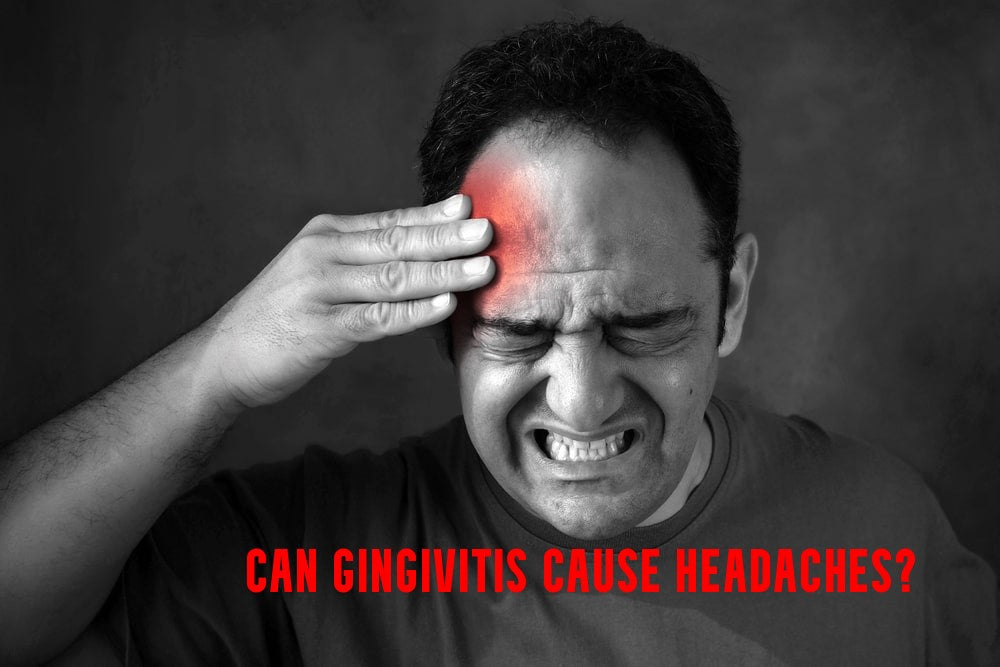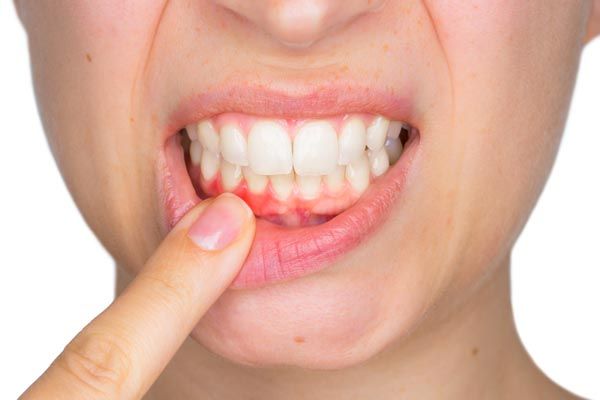Thousands of people suffer from the throbbing discomfort of headaches, and end up spending money on the remedies - thinking it’s some sort of migraine. However, this is the wrong approach. You shouldn’t be looking for solutions prior to figuring out where the source of the pain is!
Although we all assume that headaches are caused by stress, dehydration, or sinus pressure, new studies disclose an interesting relationship between the oral health and headache.
Can gingivitis cause headaches? In short, yes - it’s possible. It is a complex stream of inflammation, nerve linkages, and systemic health effects that stretch well beyond your gums.
Gum disease is a widespread pathology, and gingivitis is the most prevalent. This condition is experienced by almost every third adult person over 30.
The symptoms of this inflammatory condition appear to be a small problem at first - gums that are red, swollen and bleed as you brush them - but the repercussions of such a condition can have a very disruptive impact on your entire body.
The connection between gingivitis and headaches is an ideal illustration of how oral health is connected to our mental health as well - with the mouth serving as an open door to bacteria and inflammation that can cause the body to respond systematically to disease.
Gingivitis: An Overview
The mild form of gum disease is gingivitis. It occurs when there is plaque (filmy coat of bacteria), which forms on your teeth and inflames your gums. It results in redness, swelling and bleeding during brushing or flossing. One may think it is nothing serious, however, when gingivitis is not treated, it may result in periodontitis which is the much more severe disease of gums impacting your entire body.
Poor oral hygiene, smoking, sugary diet, and some medications are among the common causes. The bright side? Gingivitis is reversible. But, you must detect it early, and begin the treatment.
Gum Symptoms You Shouldn’t Ignore
The health of your gums is an advance indicator of your general health. They do not scream to draw some attention, but they are definitely whispering when there is something wrong. Neglecting those whispers may result in not only discomfort in the mouth, but also causes the development of a systemic condition, such as headaches.
1. Obvious Oral Signs
- Red, swollen gums
- Bleeding during brushing or flossing
- Persistent bad breath
- Receding gum line
These serve as the telltale signs commonly identified by the majority of people about gingivitis. However, that is not the whole story. These symptoms are not just cosmetic, this is a sign of inflammation, bacterial overload, and degradation of the gum tissue, which may lead to periodontitis, when untreated.
2. Systemic or "Non-Oral" Signs
- Fatigue
- Mild fever
- Tooth sensitivity
- A dull headache that creeps up around the temples or jawline
Here’s the scoop for people who are wondering: can gingivitis cause headaches - Yes, there’s a possibility, especially when these non-oral manifestations are accompanied by gum manifestations. The dull throbbing head pain that seems to come out of nowhere, could be the product of your own swollen gums and hyperactive nerves.
3. Inflammation Beyond the Mouth
The gum inflammation can overflow into the bloodstream. When there is chronic gum disease, your body perceives it as a continuous threat, thus keeping itself in a high alert mode. This chronic inflammation may irritate blood vessels, exhaust your immune system and cause symptoms that you would never expect to be related to it, such as frequent headaches.
4. Clues in the Timing
Do you experience a headache soon after flossing or brushing? Do they get any worse in the mornings or after eating? These patterns can allow you to identify the cause of your headaches as concerning oral health. Check the condition of your gum when your head aches. In case of tenderness, bleeding, or swelling, the cause may be gingivitis.
How Gingivitis Might Be Linked to Headaches
Now for the big question: can gingivitis cause headaches? The answer? Yes, it’s entirely possible.
When your gums become inflamed, your body will fight back by creating inflammatory markers - such as cytokines, which will spread in your system. These can interfere with your blood vessels and nerves thus causing headache. In case you already experienced a persistent, tedious headache and nothing helps: such as drinking water, caffeine, rest, then you should consider having a dentist examine your gumline.

Inflammation Isn’t Just Local, It Travels
Inflammation that starts in the gums doesn’t stay put. The cytokines that are released in gingivitis are capable of getting into your own blood stream and thus into other tissues and organs, including your brain. These inflammatory chemicals have the capacity of bringing about a change in the circulation of blood in the head and the changes may lead to pressure or the sensation of throbbing just like headache or even migraines.
It is this systemic effect that has led many experts to the notion that chronic gingivitis may be a possible inducer of the unexplained, and the recurring headache.
Muscle Strain and Misalignment
Also, don’t underestimate the physical tension caused by gum pain. It can alter the way you chew, hold your jaw, and even the way you sleep. That added strain can lead to tension headaches or even migraines. Misalignment from avoiding pressure on sore gums may result in tightened jaw muscles, and over time, that muscular strain radiates upward - straight to your temples and forehead.
Can Gingivitis Cause Headaches From Jaw Tension?
Yes, and here’s why: the jaw and gums are structurally and neurologically close to areas commonly affected by tension-type headaches. If inflammation or pain leads you to favor one side of your mouth while eating or clenching your jaw in response to pain, this can throw off the alignment of your entire facial structure. It's a ripple effect that ends in a throbbing head.
Stress, Oral Health, and a Vicious Cycle
Gum inflammation also leads to stress - and stress, in turn, makes gum issues worse. That ongoing cycle can magnify headache risk. You're stressed, so you might grind your teeth or clench your jaw more often. That puts pressure on both your gums and your cranial nerves. Over time, the result is not only gum recession or tooth sensitivity but persistent headaches, too.
Still asking yourself, can gingivitis cause headaches? You’re not wrong to question it. The more we learn about how oral inflammation influences the nervous system, the clearer the connection becomes.
Comparing Headache Triggers
|
Trigger |
Symptoms |
Root Cause |
Treatment |
|
Gingivitis |
Throbbing, facial/jaw pain |
Inflammation from gum disease |
Oral hygiene + anti-inflamm. |
|
Dehydration |
Dull, persistent headache |
Low water intake |
Drink fluids |
|
Eye strain |
Forehead pain, behind-the-eyes pressure |
Long screen time |
Eye rest, screen breaks |
|
Sinus infection |
Pressure in cheeks, nose |
Sinus inflammation |
Decongestants, antibiotics |
|
Migraine |
Pulsating pain, nausea |
Neurological factors |
Migraine medication |
How Your Nerves Are Involved: The Trigeminal Connection
One of the most vital nerves in your head is your trigeminal nerve. It takes care of sensation as well as motor control in your face and yes; plays a big role in oral function. This cranial nerve has three big branches to extend to your forehead, cheek, and jaw, including gums. Therefore, when there is inflammation on your gums, it is likely that the trigeminal nerve may be the first to notice.
Irritation and Nerve Activation
As gingivitis occurs, your body produces inflammatory mediators through the immunization process. These molecules aggravate nerve endings such as those linked to the trigeminal nerve. This implies that when pain is being experienced, it does not remain confined locally in your mouth- instead, it radiates.
Try to remember if you have ever experienced a toothache, if it’s continuous, your head begins to ache too. This explains how close-knit this nerve system truly is.
Can gingivitis cause headaches? The answer is yes; when there is trigeminal irritation. When this nerve is overstimulated it may result in headaches that are experienced as tension-type or even a migraine headache depending on the sensitivity and the intensity of headaches.
The Domino Effect: From Gum Pain to Head Pain
Swollen gums might make you change your chewing habits. You can begin to partial or grind over one side, or clench the jaw without even knowing you are doing it. Not only this, muscle strain leads to TMJ problems - it can directly be a cause of headache development. The muscle movement that is changed over a period of time becomes chronic and this is what tugs the tendons and nerve fibers that eventually irritate your head and neck.
Still wondering, can gingivitis cause headaches? When your headaches are typically accompanied with sore gums, bleeding and feeling pain in your jaw, it might be worth exploring it further.
When Gum Pain Meets Neural Pathways
The neural pathways that link your gums and your brain aren't theoretical; they’re anatomical. The sensory fibers of the trigeminal nerve serve as a direct communication channel between your mouth and your brainstem. When those fibers are overloaded with pain signals from gum inflammation, the brain interprets it as head pain. This is especially true in cases of chronic gingivitis, where ongoing nerve irritation becomes a daily nuisance.
So, next time you’re trying to pinpoint the cause of your persistent headaches, don’t overlook your gums. The trigeminal nerve could be the messenger—and inflamed gums might be the message
What the Research Says?
Emerging studies suggest that oral bacteria don’t just stay in the mouth. Researchers have found traces of these bacteria in arterial plaque and even in brain tissues of individuals with Alzheimer’s.
While direct links between gingivitis and headaches are still being explored, we know that chronic inflammation and bacterial migration can contribute to neurological symptoms. So asking, can gingivitis cause headaches isn’t as far-fetched as it used to seem.
Warning Signs: It’s More Than Just a Dental Issue
If you have recurring headaches that don’t respond to traditional treatments AND you’re also noticing signs of gingivitis, your body might be telling you something.
Other red flags include:
- Jaw stiffness
- Fever
- Loose teeth
- Swelling in your face or neck
These can signal that the infection is spreading beyond your gums.
Natural Preventative Steps For Healthier Gums and a Clearer Head
You know the drill: brush twice a day, floss daily, and visit your dentist regularly. But let’s go a step further.
If you’re already experiencing signs like bleeding gums, pain, or sensitivity to hot or cold, consider enhancing your routine with a natural, plant-based formula oil for gums. Look for something infused with Omega 3 and 9 oils, along with neem and clove essential oils. These ingredients are known for their anti-inflammatory, antibacterial, and soothing properties.
Omega 3s help reduce systemic inflammation, neem is a natural antibacterial agent, and clove oil has been used for centuries to relieve oral pain. When combined, they offer a powerful, holistic approach to oral care.
So if you’re wondering can gum disease cause headaches, start by giving your gums the support they need.
Why Ignoring Gingivitis Isn’t Worth the Risk
Untreated gingivitis can turn into periodontitis, which not only leads to tooth loss but has also been linked to systemic diseases like:
- Heart disease
- Diabetes
- Respiratory infections
- Cognitive decline
And yes, chronic headaches. So if you keep asking yourself, can gingivitis cause headaches, consider it your body’s nudge to take action.
When Should You See a Dentist?
If your gums bleed regularly, feel tender, or you’re experiencing unexplained headaches, it’s time to make an appointment.
Address the root of the problem before it causes further damage. And while you’re at it, build a daily routine with all-natural products that support oral and whole-body health.
FAQs
Can gingivitis cause headaches every day?
Yes. Chronic gum inflammation can lead to daily, low-grade headaches by affecting nerves and triggering systemic inflammation.
Can gum disease cause headaches and jaw pain at the same time?
Absolutely. Inflamed gums can irritate the jaw and surrounding muscles, resulting in pain that radiates to your head.
Is it normal to get a headache after dental cleaning?
Sometimes. If your gums are already sensitive or inflamed, the irritation during cleaning might trigger a temporary headache.
Can treating gingivitis help reduce headaches?
Yes. Reducing inflammation in your gums can lead to fewer systemic symptoms, including headaches.
How long does it take to heal from gingivitis naturally?
With consistent care and natural support, early-stage gingivitis can improve in as little as one to two weeks.
Outlook
So, can gingivitis cause headaches? It certainly can. Your mouth and your brain are more connected than you might think.
If you want a clearer head and a healthier smile, support your gums by using our The Goodbye Company gum disease oil - as it contains natural ingredients that calm inflammation, fight bacteria, and promote healing. Start today, and your whole body will thank you tomorrow.













